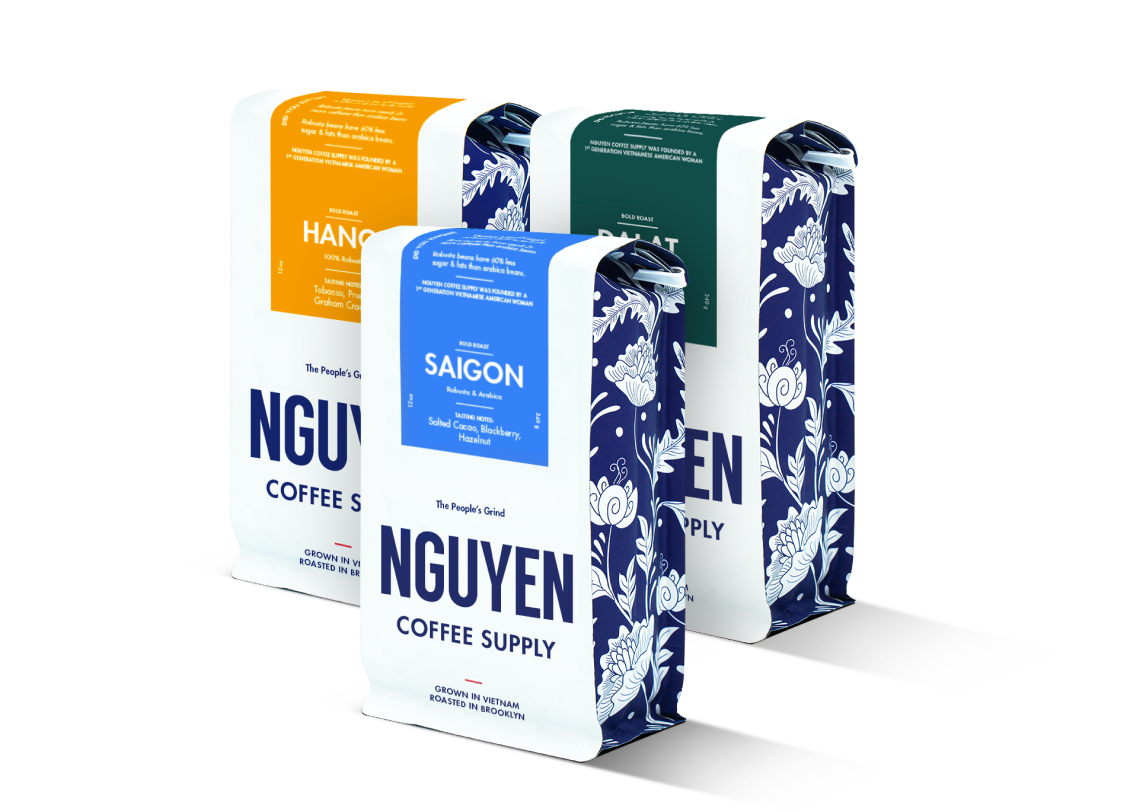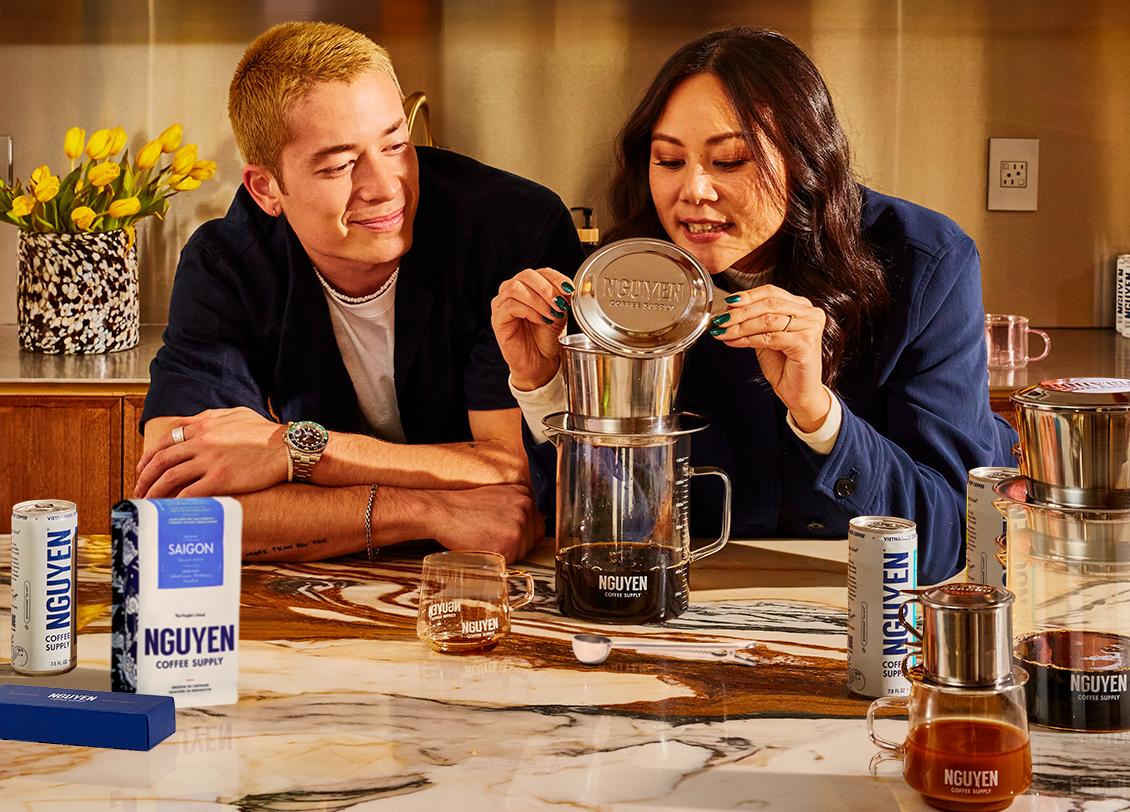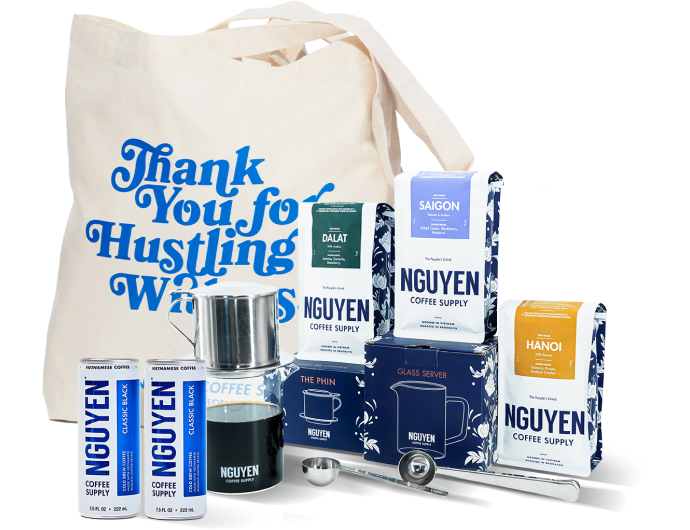

- FEATURED ON IMBIBE

Create for yourself or as a gift for your loved ones
Subscribe nowMe and mom just enjoyed the Nguyen phin drip experience. Wow. Proud of your work. We without hesitation enjoy the Vietnamese coffee and recommend your products. Thank-you to the Nguyen staff and tradition. From Canada eh!
Much like many global food systems, the current coffee industry is not sustainable. Researchers predict that half of all arable land for coffee production will be gone by 2050 due to climate change. In countries like Brazil, the world’s leading coffee producer, these effects are already being seen with many farmers experiencing drying lands in conjunction with unusual frosts that have decimated yields.
All the while, demand for coffee globally has only increased with countries such as China seeing exceptionally growing demand in select cities and overall consumption globally on the increase. Herein lies the issue: growing demand for coffee cannot be met with slower-to-grow supply, especially when the supply is constantly on the precipice of decline.
While it would be impossible to shrink demand for commodities such as coffee, there are alternative solutions to meet the growing global demand. Currently, two species of coffee are the most widely consumed around the world: arabica and robusta. Most of the specialty coffee and premium varieties available on the market are arabica while most instant and commercial coffees are robusta.
Arabica coffee is notoriously finicky and resource intensive– it can only grow in certain temperatures and at certain altitudes. Robusta, on the other hand, can grow at a variety of climates and altitudes and is naturally more pest resistant than arabica due to its higher caffeine content which acts as a natural repellent.
Given these natural properties, robusta coffee seems to be the clear choice for the long term health of the coffee industry. Robusta has historically been cultivated for high volume as opposed to high quality, and industry gatekeepers have given it an unfair reputation as being bad or inferior while keeping its prices artificially low in order to benefit their own bottom line through continued production of high yield, low quality coffee for mass market consumption. As such, producers have been unable to better their products or their livelihoods due to being stuck in cycles of exploitation– but this can all change (and should) as the industry realizes that the status quo is unsustainable.
With its ability to grow in various conditions while being less resource intensive relative to arabica, robusta coffee may be the coffee industry’s hope for long term success. With the rise of robusta and industry leaders starting to invest in high quality robusta coffee, historical and unfair reputations are being swept away while a shift toward a more inclusive coffee culture occurs.
Robusta coffee is finally getting the respect it’s been long overdue. As climate change continues to exacerbate the conditions for millions of people and their livelihoods across the globe, robusta coffee holds a key toward preventing total systematic collapse of the coffee industry. As producers and consumers alike pivot to investing in robusta as a premium yet everyday coffee product, we will begin to see changes in the industry as well as the sustainability of coffee itself.
Coffee farmers in Brazil have begun to shift their focus to developing and growing specialty varieties of robusta and Vietnam, the world’s leading producer of robusta coffee, continues to produce annual yields for both the mass market and specialty coffee worlds. As the collective consciousness of the coffee industry continues to consider the future of coffee, the shift from cheap goods to premium coffee will only grow (for the better).
Coffee is not meant to be a cheap product– the amount of resources, labor, and effort it takes to produce a single cup of coffee are indicative of the need to shift our perceptions around coffee as a good. As the industry continues to invest in robusta and develop the world’s second most widely consumed type of coffee, we will also hopefully begin to realize the same.
Learn more about the history of robusta coffee here.
Learn more about the rising prices of coffee here.